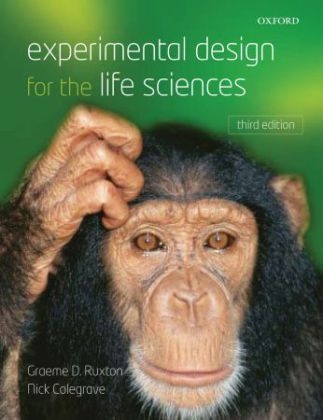
Experimental Design for the Life Sciences
Oxford University Press (Verlag)
978-0-19-956912-0 (ISBN)
- Titel ist leider vergriffen;
keine Neuauflage - Artikel merken
At the core of good research lies the careful design of experiments. Yet all too often a successful design comes only after a painful trial-and-error process, wasting valuable time and resources. Experimental Design for the Life Sciences teaches the reader how to effectively design experiments to ensure today's students are equipped with the skills they need to be the researchers of tomorrow. With a refreshingly approachable and articulate style, the book explains the essential elements of experimental design in clear, practical terms, so the reader can grasp and apply even the most challenging concepts, including power analysis and pseudoreplication. The inter-relatedness of experimental design, statistics, and ethical considerations is emphasised throughout the book. The use of examples drawn from the primary literature ensures the reader fully understands how the theory of experimental design is applied within the broader context of real biological research.
Above all, Experimental Design for the Life Sciences demonstrates how good experimental design relies on clear thinking and biological understanding, not mathematical or statistical complexity - putting it at the heart of any biosciences student's education. * Self-test questions, with answers at the end of the book, encourage students to check their understanding as they progress and reinforce essential facts * Take-home messages throughout chapters focus the students' attention on the principles they must grasp * Discussion of ethical issues, flagged in the margin, raises awareness of this important aspect of experimental design Online Resource Centre The Online Resource centre to accompany Experimental Design for the Life Sciences features: For students: Self-test questions and answers Extra questions Links to useful websites and free software For lecturers: Figures from the book, available to download Practical exercises - to be used in class, with instructor's and demonstrator's notes, handouts for students, files to run the exercises, and follow-up activities
Graeme Ruxton obtained a first degree in Physics before getting a PhD in Statistics and Modelling Science. After his PhD he worked for several years with the Scottish Agricultural Statistical Service in Edinburgh. He then got a lectureship in Ecology at the University of Glasgow, where he is now Professor of Theoretical Ecology. Nick Colegrave trained as an evolutionary biologist, obtaining his first degree at the University of Sussex, and his PhD on the evolution of competition strategies at the University of Sheffield. Since then he has held a number of postdoctoral research positions at a range of universities including, McGill, St Andrews, Glasgow and Edinburgh, working on various aspects of evolutionary biology, with a range of organisms. At various points he has also held the post of zoology demonstrator at the University of Edinburgh, teaching experimental design to zoology students and advising on statistics. He is now lecturer in Biology at Edinburgh.
PREFACE - HOW TO USE THIS BOOK ; ANSWERS TO SELF-TEST QUESTIONS ; FLOW CHART ON EXPERIMENTAL DESIGN ; BIBLIOGRAPHY ; INDEX
| Erscheint lt. Verlag | 4.11.2010 |
|---|---|
| Zusatzinfo | 28 line illustrations |
| Verlagsort | Oxford |
| Sprache | englisch |
| Maße | 188 x 247 mm |
| Gewicht | 398 g |
| Themenwelt | Mathematik / Informatik ► Mathematik |
| Naturwissenschaften ► Biologie ► Allgemeines / Lexika | |
| Weitere Fachgebiete ► Land- / Forstwirtschaft / Fischerei | |
| ISBN-10 | 0-19-956912-6 / 0199569126 |
| ISBN-13 | 978-0-19-956912-0 / 9780199569120 |
| Zustand | Neuware |
| Haben Sie eine Frage zum Produkt? |
aus dem Bereich


